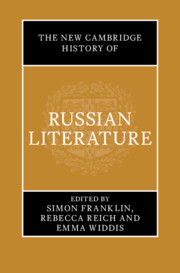Book contents
- The New Cambridge History of Russian Literature
- The New Cambridge History of Russian Literature
- Copyright page
- Contents
- Figures
- Contributors
- Acknowledgements
- On Transliteration, Names, and Dates
- Introduction
- History 1 Movements
- 1.1 The Age of Devotion
- 1.2 The Baroque Age
- 1.3 The Age of Classicism
- 1.4 Sentimentalism and Romanticism
- 1.5 The Natural School and Realism
- 1.6 Symbolism and the Fin de Siècle
- 1.7 Modernism and the Avant-Garde
- 1.8 Socialist Realism
- 1.9 Postmodernism
- 1.10 Contemporary Movements
- Boxes 1 Close Readings
- Boxes 2 Genres
- History 2 Mechanisms
- History 3 Forms
- History 4 Heroes
- Index
- References
1.5 - The Natural School and Realism
from History 1 - Movements
Published online by Cambridge University Press: 31 December 2024
- The New Cambridge History of Russian Literature
- The New Cambridge History of Russian Literature
- Copyright page
- Contents
- Figures
- Contributors
- Acknowledgements
- On Transliteration, Names, and Dates
- Introduction
- History 1 Movements
- 1.1 The Age of Devotion
- 1.2 The Baroque Age
- 1.3 The Age of Classicism
- 1.4 Sentimentalism and Romanticism
- 1.5 The Natural School and Realism
- 1.6 Symbolism and the Fin de Siècle
- 1.7 Modernism and the Avant-Garde
- 1.8 Socialist Realism
- 1.9 Postmodernism
- 1.10 Contemporary Movements
- Boxes 1 Close Readings
- Boxes 2 Genres
- History 2 Mechanisms
- History 3 Forms
- History 4 Heroes
- Index
- References
Summary
This chapter outlines the history of Russian Realism against a European backdrop. In the Russian Empire, as in Europe, there were no influential aesthetic manifestos predating the rise of Realist literature. Although the first seeds of the movement can be seen in the work of Aleksandr Pushkin, Nikolai Gogol, Mikhail Lermontov, and the critic Vissarion Belinskii, this chapter considers the dominant period of Russian Realism to be the period from 1845 to the 1880s. The Natural School foregrounded the genre of the physiological sketch and produced the first Realist novels by Fedor Dostoevskii, Aleksandr Herzen, and Ivan Goncharov. The ‘High’ Realism of the 1850s−80s featured a proliferation of the novel as a genre and thematic preoccupations with the role of gentry, the peasant question, political radicalism, the ‘woman question’, and bureaucracy.
Keywords
- Type
- Chapter
- Information
- The New Cambridge History of Russian Literature , pp. 89 - 106Publisher: Cambridge University PressPrint publication year: 2024

